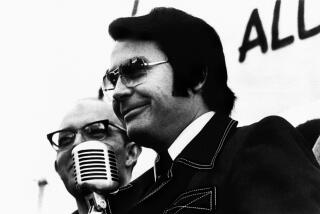Armed Forces Turn to Contemporary Religious Programs : Broadcasting: U.S. military network now offers Christian rock, black gospel. Traditional shows featuring Billy Graham and others have been dropped or shortened.
- Share via
Religious programming was once ranked at the bottom of the popularity scale by the young listeners and viewers of Armed Forces Radio and Television.
Today, however, Christian rock music, black gospel singing and Top 10 contemporary Christian music dominate the five weekly hours of religious radio offered to military stations. And the religious television package is livelier, too, with magazine-format shows and religious videos done in the MTV style.
The transformation was largely the effort of two chaplains at a little-known military facility in the San Fernando Valley--the Armed Forces Radio and Television Service Broadcast Center in Sun Valley.
“For the first time, both radio and television religious programming . . . will be compatible with our audience’s lifestyles and tastes,” Army Maj. David Smith, religious program coordinator, wrote to fellow chaplains after the revamped schedules were introduced last April.
“The feedback was extremely positive from programmers at a meeting here last December because 70% of our audience is between the ages of 18 and 28,” Smith said in an interview.
Gerald Fry, a civilian who directs programming and news at the Sun Valley center, confirmed that the changes have had a good response.
“If it were my choice, I’d put the Mormon Tabernacle Choir on every week,” said Fry, who has been in broadcasting since 1952. “But the more contemporary the program, the more popular they are compared to the old-style religion programs.”
Evangelist Billy Graham’s “Hour of Decision,” for instance, was dropped along with other traditional religious radio shows, including one from the Salvation Army.
The format innovations on the military network were launched by Smith’s predecessor, Air Force Maj. Richard Davenport. One well-received change, Fry said, was the introduction of religious-themed children’s TV programs for military families with small children.
The Armed Forces Radio and Television Network, heard in 128 countries and on ships at sea, selects news, sports, situation comedies, movies, specials and other programming. Extra news coverage of disasters is picked up from the major broadcast networks and CNN and transmitted by satellite.
Its limited budget has diminished because of military cutbacks, so the broadcast center relies on the patriotism of networks and on producers to donate their products.
Some religious broadcasters go even further to accommodate the needs of the Armed Forces Network. For instance, Pat Robertson’s “700 Club” is pared down to half an hour by his Family Channel editors and the Rev. Robert Schuller’s “Hour of Power,” the top-rated syndicated religious program in the country, is edited to 30 minutes by technicians at the Crystal Cathedral, Smith said.
“White Heat,” a Christian metal music show produced by broadcaster Ken Roberts of Torrance, is done free of charge solely for the military network. “Love on a Rock” (top hits) and “Amen Corner” (black gospel) also are specially produced for the network.
“You can’t hear these programs anywhere else,” said Smith, 38, a United Methodist minister who is halfway through a three-year assignment at the broadcast center.
Some of the biggest concerns, however, are to present programs that appeal to a variety of faiths and ethnic groups and to assure that the spiritual exhortations do not include pleas for money.
On radio, “East of Eden,” a Jewish program of music and talk, is offered at eight holiday times during the year. “Passages,” an award-winning program featuring interviews of people whose faith helped them overcome traumatic experiences, is produced by the Presbyterian Media Mission in Pittsburgh.
On television, “The Jesuit Journal” and “Catch the Spirit” offer interviews on current faith issues from the Catholic and Methodist perspectives respectively. When “Hour of Power” is not showing, the military network offers the upbeat “Outreach of Love” Sunday service from an African Methodist Episcopal church in Baltimore led by Pastor Frank Reid, formerly of Los Angeles.
“As a chaplain, I don’t want to play the ratings game, but if the servicemen and women are not listening or watching, then we are not reaching them,” Smith said.
More to Read
The complete guide to home viewing
Get Screen Gab for everything about the TV shows and streaming movies everyone’s talking about.
You may occasionally receive promotional content from the Los Angeles Times.






